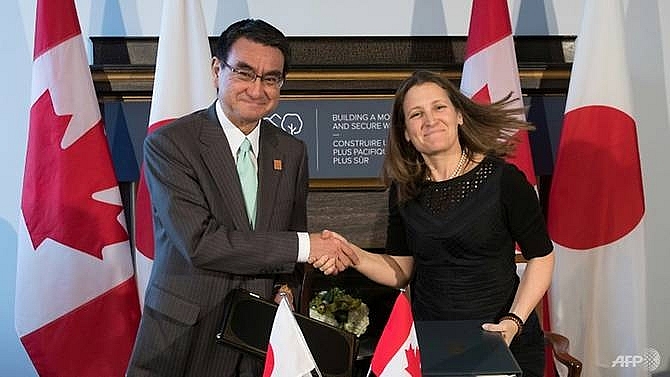G7 ministers meet on Russia, Iran and North Korea threats
 |
| Canada's Minister of Foreign Affairs Chrystia Freeland, seen here with Japanese Foreign Minister Taro Kono, will host all of her G7 colleagues plus the European Union's representative at a working lunch to discuss the crisis in Russia and Ukraine. (AFP/Lars Hagberg) |
The envoys were also keen to glean clues from their US colleague about whether President Donald Trump will tear up the Iran nuclear deal and how he will handle a planned summit with North Korea's Kim Jong Un.
The ministers from the world's most powerful democracies are meeting to plan for June's G7 summit of rich-world leaders in Charlevoix, Quebec - but Russia and North Korea will never be far from their minds.
Canada's Foreign Minister Chrystia Freeland hosted the meeting and invited her G7 colleagues plus the European Union's representative to a working lunch to discuss the crisis in Ukraine, where Russian-backed rebels have seized the eastern Donbas region.
Afterwards, she said the G7 members had "reaffirmed our unity in support of Ukraine and a rules-based international order where state sovereignty and territorial integrity are respected by all.
Acting US Secretary of State John Sullivan's first bilateral meeting was with Ukraine's Foreign Minister Pavlo Klimkin, and he "reaffirmed the United States' ironclad support for the sovereignty and territorial integrity of Ukraine in the face of Russian aggression."
DEADLY NERVE AGENT
G7 capitals are also worried about Russia's role in supporting Syrian leader Bashar al-Assad's regime in his country's brutal civil war and alleged attempt to kill a defector with a nerve agent on British soil.
France's President Emmanuel Macron, who meets Trump on Monday at the White House, said in an interview that the West must stand up to Putin's attacks on western democracy, including the spreading of "fake news."
"He's strong and smart. But don't be naïve. He's obsessed by interference in our democracies," Macron told Fox News on Sunday. "That's why I do believe that we should never be weak with President Putin. When you are weak, he uses it."
After their lunch, the ministers will also hold a meeting on North Korea and nuclear non-proliferation.
Last month, in one of the most surprising twists in world affairs for decades, Trump accepted an invitation from Pyongyang's eccentric autocrat Kim to a summit to discuss to discuss his nuclear disarmament.
TOUGHER NUCLEAR CONTROLS
The G7 members, including frontline state Japan, support efforts to convince Kim to end his efforts to develop a strategic nuclear missile arsenal, but are also keen to hear more from the US side.
Kim is sure to have demands of the West and allies are keen to ensure that Trump does not give too much away to secure a historic deal.
The North Korea meeting will be followed by one of the so-called "Quad" - the United States plus France, Britain and Germany, the Western partners who, with Russia and China, signed the 2015 Iran nuclear deal.
Trump has threatened to tear up the agreement unless European capitals agree to supplement it with tougher controls on Iran's missile programme and future ability to return to nuclear fuel enrichment.
But his partners continue to believe the implementation of the agreement under the Joint Comprehensive Plan of Action (JCPOA) represents the best way to prevent Tehran from seeking the atomic bomb, and will not miss a chance to lobby Sullivan to convince Trump to reverse course.
"We've been negotiating with the Europeans," a senior US official told reporters ahead of the talks. "We've made a great deal of progress but we're not there yet."
Ahead of the Quad meeting, Sullivan stepped aside for a brief one-on-one meeting with British Foreign Secretary Boris Johnson.
As the pair sat down in the office of the chancellor of the University of Toronto, Johnson could be heard telling his US counterpart "one of the things we are concerned about now is the JCPOA and where that is headed."
Ahead of Sunday's meetings, the US official had briefed reporters that the talks would focus on the way forward in Syria, Iran's alleged "malign activities" in the Middle East region and North Korea's missile and nuclear programs.
The ministers would also, he said, discuss maritime security in the context of protecting freedom of navigation in the South China Sea in the face of China's moves to reinforce its disputed claim on the waters.
After the foreign affairs meetings, the ministers will be joined on Monday by their domestic security counterparts and the discussions will be widened to encompass counter-terrorism and cyber security.
What the stars mean:
★ Poor ★ ★ Promising ★★★ Good ★★★★ Very good ★★★★★ Exceptional
Related Contents
Latest News
More News
- Foreign leaders extend congratulations to Party General Secretary To Lam (January 25, 2026 | 10:01)
- Russian President congratulates Vietnamese Party leader during phone talks (January 25, 2026 | 09:58)
- Worldwide congratulations underscore confidence in Vietnam’s 14th Party Congress (January 23, 2026 | 09:02)
- Political parties, organisations, int’l friends send congratulations to 14th National Party Congress (January 22, 2026 | 09:33)
- 14th National Party Congress: Japanese media highlight Vietnam’s growth targets (January 21, 2026 | 09:46)
- 14th National Party Congress: Driving force for Vietnam to continue renewal, innovation, breakthroughs (January 21, 2026 | 09:42)
- Vietnam remains spiritual support for progressive forces: Colombian party leader (January 21, 2026 | 08:00)
- Int'l media provides large coverage of 14th National Party Congress's first working day (January 20, 2026 | 09:09)
- Vietnamese firms win top honours at ASEAN Digital Awards (January 16, 2026 | 16:45)
- ASEAN Digital Ministers' Meeting opens in Hanoi (January 15, 2026 | 15:33)

 Tag:
Tag:




















 Mobile Version
Mobile Version